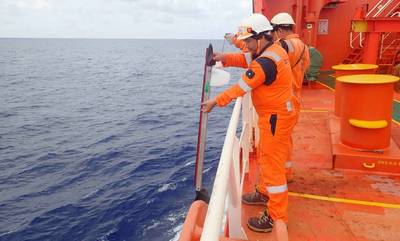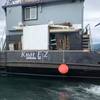Shipshave Scoops Award for In-Transit Hull Cleaning Solution
Shipshave has won the Most Innovative Proven Technology Award in the inaugural SNIC Innovation Awards for its in-transit hull cleaning solution that removes biofouling to boost fuel efficiency and decarbonization.
The prize was handed out at the Singapore Norway Innovation Conference (SNIC) 2023, with the theme Innovate to Zero, that is hosted annually in Singapore by the Norwegian Business Association Singapore (NBAS).
Shipshave earned the accolade for having “the most innovative commercial-ready and implementable solutions or products proven to impact the maritime industry through improving operational efficiency, sustainability or decarbonization,” according to the award citation.
The Stavanger-based company was selected among a strong field of candidates for the award by an expert jury including Innovation Norway’s technology advisor Per Christer Lund and DNV Maritime’s Regional Manager South East Asia, Pacific & India, Cristina Saenz de Santa Maria.
“We are extremely honoured and delighted to have secured this award, which represents a strong endorsement of our unique low-cost solution to reduce biofouling en-route, thereby contributing to cleaner hulls with less drag to cut fuel consumption and emissions,” says Shipshave’s CEO Aage Hoejmark.
He continues: “This is a well-deserved recognition of the work done by our team together with our partners and early adopters. Innovation Norway and the Norwegian Research Council also deserves an honourable mention for having contributed to the funding of the in-transit cleaning of hulls development.”
Shipshave’s solution is a semi-autonomous hull-cleaning robot that can be deployed by the crew from a portable winch mounted on the forecastle deck.
The robotic tool harvests propulsion energy to stay attached to the hull and swipe up and down the hull underwater using soft brushes. An integrated video camera on the device enables real-time monitoring of the hull cleaning process and post-cleaning inspection via a digital application.
It is estimated the technology can clean between 80-90% of the parallel/vertical area of a Handysize bulker’s hull during sailing in a five-hour operation, with typical opex of less than $250 per cleaning.
According to the IMO’s GloFouling report, well maintained hulls can contribute to a 5-25% reduction in GHG emissions. This means vessel speed can be maintained during transit while still meeting CII requirements, thereby avoiding slow steaming that involves costly derating of the engine, according to Hoejmark.
The technology, initially trialled in 2019, is now being implemented in fleet operations by several major industry players following successful testing on a number of vessels. Stolt Tankers reported a marked reduction in fuel consumption following an initial trial of solution on its vessel Stolt Acer during a voyage from Port Said, Egypt to Algeciras, Spain and has expanded trials of the solution to five more ships.
Klaveness Combination Carriers is expanding roll-out of the robots across its fleet with five additional units after pilots on four vessels showed fuel efficiency improvements of between 2-5%. Furthermore, Teekay Tankers plans to install Shipshave on four more vessels this year after a successful trial.
A fuel consumption assessment conducted by DNV found that Shipshave’s technology can deliver fuel savings of around 10% when used regularly.
Shipshave is designed as a proactive solution for hull cleaning as an alternative to retroactive cleaning in ports. This avoids the need for off-hire deviations to approved ports for cleaning with associated scheduling and logistics, while also saving time on port turnarounds, Hoejmark explains.
There are further environmental benefits as being able to remove and dispose of fouling mid-ocean rather than in port curbs the spread of non-indigenous invasive species to coastal ecosystems. This also prevents deposits of biocide and plastic residues due to erosion of anti-fouling coatings with heavy-duty cleaning in port.
“Our mission is to redefine hull maintenance, enabling the crew to take control over hull performance and thereby improve voyage efficiency,” says Shipshave’s founder Rune Freyer.













